pro:motion – supporting active mobility by target group orientation and motivation
Short Description
Starting point / motivation
Promoting active mobility of people is of essential importance when it comes to tackling societal challenges such as health and quality of life issues and increasing sustainability in general.
However, in many cases these goals cannot be achieved due to the inefficient implementation of solutions and developments, as they do not meet the expectations of the people due to a lack of acceptance. Exploiting unused potentials of active mobility and making it more attractive to people requires devising both adequate information offers and services, but also appropriate incentives and motivations to arouse interest and actually change mobility behaviour.
Attitude and behaviour of people within many population groups need to be particularly addressed (e.g. elderly people and teenagers), however, they are often very heterogeneous. The same holds for the perceived barriers of people against active mobility forms. Therefore well-founded and concrete insights into attitudes of and obstacles for people regarding the communication of active mobility had to be worked out in order to develop effective incentives, measures and solutions.
Contents and goals
The focus of the research approach pro:motion was mainly the investigation and categorisation of diverse patterns of mobility-related behaviour and attitudes of users of mobility-related information, in order to identify classes of homogeneous information needs, be used for the further development of user-oriented information services and measures for promoting active forms of mobility.
Methods
By incorporating the following qualitative-interpretative and quantitative-statistical methods from established approaches of combining social milieu research and mobility research the used approach did not follow common habits of partitioning user groups (based on e.g. sex, age):
- actual everyday life conditions
- attitudes
- preferences
- aversions
- habits and constraints
pro:motion aimed at the identification of target groups who show homogeneous mobility behaviour patterns and require the same content of mobility-related information, or can be addressed via particular arguments for promoting sustainable mobility behaviour (e.g. health, environment, costs, image, adventure).
The resulting groups were subsequently quantified and comprehensively described in order to allow further incorporation of the specific knowledge in future research and development projects.
Results and Conclusions
The results of pro:motion are well-defined homogeneous target groups and tailor-made concepts for specifically addressing each target group, e.g. arguments, information needs, preferred information channels, thus providing a solid base for implementing measures in order to promote active mobility forms. The following types have been worked out:
- Typ 1: Spontaneous – On the go
- Typ 2: Highly informed sustainability
- Typ 3: Efficiency- or information pickers
- Typ 4: Interested Conservatives
- Typ 5: Low Demand
- Typ 6: Digital Illiterates
These results will be used for the improvement of a successful and target-group-oriented realisation of projects which foster solutions for active mobility in the future.
Publications
pro:motion - Topology report

In pro:motion, methods from social sciences are applied in order to identify homogeneous groups of shared mobility-related information needs and to extract appropriate group-related arguments (e.g. health, environment, costs, image, adventure) in order to create incentives for active mobility.
Dr. Beatrix Brauner, Mag. Karin Bauer, Mag. Martin Mayr
Publisher: BMVIT
German, 113 Seiten
Publication Downloads
The Drive to Walk: Identifying Milieu-based Persuasion Strategies for Motivating Active Mobility

11th International Conference on Persuasive Technology (Persuasive Technology 2016), Workshop Empowering Cities for Sustainable Wellbeing, Salzburg, Austria
Millonig, A., Markvica, K., Haufe, N.
Publisher: Springer - Verlag Berlin Heidelberg 2011
English, 11 Seiten
Publication Downloads
Project Partners
Project manager
DI Dr. Alexandra Millonig - AIT Austrian Institute of Technology GmbH
Project and cooperation partners
- Mag. Michael lagler - Sensor Marktforschung
- o.Univ.-Prof. Mag. Dr. Jens Dangschat - Technische Universität Wien - Department Raumplanung, Fachbereich Soziologie
- DI. Norbert Sedlacek - Herry Consult GmbH
- Mag. Martin Mayr - INTEGRAL Markt- und Meinungsforschungsges.m.b.H.
Contact Address
AIT Austrian Institute of Technology GmbH
DI Dr. Alexandra Millonig
Tel.: +43 (50550) 550-6672
E-mail: alexandra.millonig@ait.ac.at
